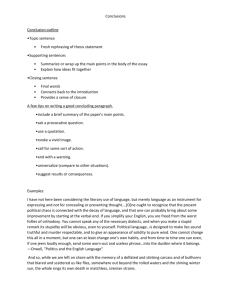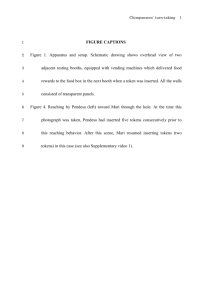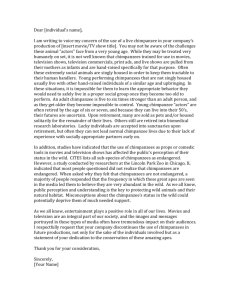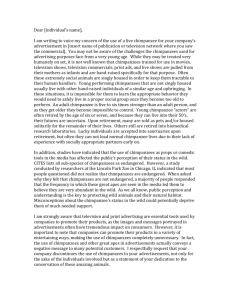Animal Issues for December 13, 2011
advertisement
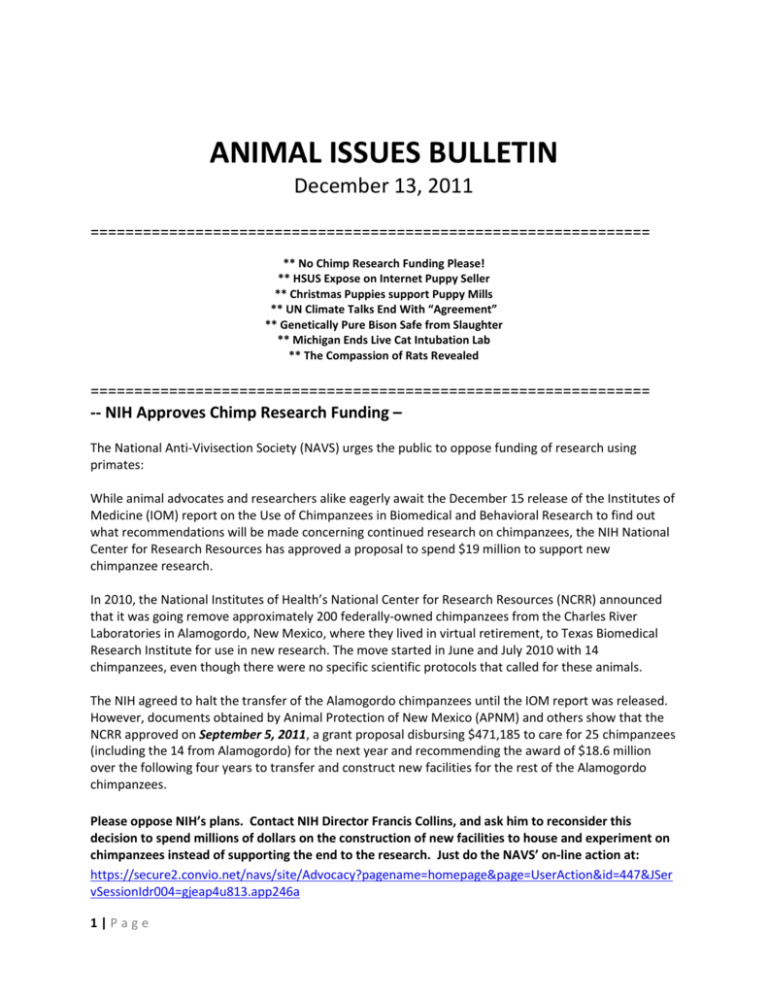
ANIMAL ISSUES BULLETIN December 13, 2011 ================================================================ ** No Chimp Research Funding Please! ** HSUS Expose on Internet Puppy Seller ** Christmas Puppies support Puppy Mills ** UN Climate Talks End With “Agreement” ** Genetically Pure Bison Safe from Slaughter ** Michigan Ends Live Cat Intubation Lab ** The Compassion of Rats Revealed ================================================================ -- NIH Approves Chimp Research Funding – The National Anti-Vivisection Society (NAVS) urges the public to oppose funding of research using primates: While animal advocates and researchers alike eagerly await the December 15 release of the Institutes of Medicine (IOM) report on the Use of Chimpanzees in Biomedical and Behavioral Research to find out what recommendations will be made concerning continued research on chimpanzees, the NIH National Center for Research Resources has approved a proposal to spend $19 million to support new chimpanzee research. In 2010, the National Institutes of Health’s National Center for Research Resources (NCRR) announced that it was going remove approximately 200 federally-owned chimpanzees from the Charles River Laboratories in Alamogordo, New Mexico, where they lived in virtual retirement, to Texas Biomedical Research Institute for use in new research. The move started in June and July 2010 with 14 chimpanzees, even though there were no specific scientific protocols that called for these animals. The NIH agreed to halt the transfer of the Alamogordo chimpanzees until the IOM report was released. However, documents obtained by Animal Protection of New Mexico (APNM) and others show that the NCRR approved on September 5, 2011, a grant proposal disbursing $471,185 to care for 25 chimpanzees (including the 14 from Alamogordo) for the next year and recommending the award of $18.6 million over the following four years to transfer and construct new facilities for the rest of the Alamogordo chimpanzees. Please oppose NIH’s plans. Contact NIH Director Francis Collins, and ask him to reconsider this decision to spend millions of dollars on the construction of new facilities to house and experiment on chimpanzees instead of supporting the end to the research. Just do the NAVS’ on-line action at: https://secure2.convio.net/navs/site/Advocacy?pagename=homepage&page=UserAction&id=447&JSer vSessionIdr004=gjeap4u813.app246a 1|Page Dear [Decision Maker], I am outraged to learn that the NCRR has chosen to ignore its agreement to postpone the transfer of nearly 200 chimpanzees from the Alamogordo Primate Facility (APF) on Holloman Air Force Base in New Mexico to Texas Biomedical Research Institute for a return to active research. These chimpanzees were retired from research in 2001 after years in the biomedical research industry and should be allowed to spend their remaining years living in a sanctuary, not swiftly end their days involved in active protocols. Earlier this year, NIH agreed to wait until a report is issued by the Institute of Medicine's Committee on the Use of Chimpanzees in Biomedical and Behavioral Research before it took action on returning these chimpanzees to research. The report was not even written when NCRR approved a grant to Texas Biomedical for $471,185 for the next year and recommending $18.6 million over the following four years. Many scientists are reevaluating the scientific and ethical evidence for conducting invasive experiments on great apes. The U.S. Fish and Wildlife Service is considering a proposal to list all chimpanzees as endangered under the provisions of the Endangered Species Act. And legislation is pending to end research on great apes altogether. Yet in these challenging economic times, NIH has $18.6 million of taxpayer money to subject these chimpanzees--an aging population, many with compromised immune systems--to more cruel and archaic research in an area that has NOT been shown to need more research animals. I hope that you will reconsider this decision regarding the fate of the chimpanzees at Charles River Laboratories, and the chimpanzees already moved to Texas Biomedical, and instead use any proposed funding to retire them to a sanctuary for the rest of their lives. Sincerely, [Your Name] [Your Address] [City, State ZIP] ================================================================ -- Today Show Segment on Puppy Mills – On December 7, the Today Show’s Lisa Myers aired the HSUS video footage of its investigation into a Florida company called Purebred Breeders LLC. The show explains how the company makes huge profits by making the public believe that its puppies are healthy and the parents are housed and bred in clean, humane conditions. If you missed it you can see the interview and share it with friends by going to: http://today.msnbc.msn.com/id/26184891/vp/45580711#45580711 Wayne Pacelle’s blog has more details. Here is an excerpt: Purebred Breeders makes most of its profits during the holiday season. Please share our video, the Today Show piece, or Jeff Burnside's NBC Miami piece [http://www.nbcmiami.com/news/Lawsuit-Filed-Against-Local-Internet-Dog-Seller135084858.html] on the subject with people concerned about the welfare of animals and ask them to share it with others to spread the word. Purebred Breeders has already caused enormous pain and suffering. Let's make sure people stop buying dogs online so that this deceptive company and others cannot continue doing business this way. You can also help by letting federal regulators know how you feel about this. Here is an excerpt from the Miami story: Purebred Breeders is little more than a telephone call center in a non-descript business park off Flamingo Road. But its hundreds and hundreds of websites often make it appear like a local dog breeder. "California English Bulldogs," for example, or "Florida Golden Retrievers" - quietly bring the customer to the same call center in Broward County where the lawsuit claims they will sell you a puppy from a puppy mill usually located in the Midwest. 2|Page Several inside sources tell NBC Miami the operation sells more than 16,000 dogs a year, supplied by 2,000 breeders. Christmas is the busiest time of year. Prices can go up to $4,000 and more and, the sources say, are marked up 100-150 percent, creating a hefty profit for Halberg, who lives in an estate in Southwest Ranches complete with a long, private driveway and guest house. To let the federal government know how you feel about this, complete the form you will find at https://secure.humanesociety.org/site/Advocacy?cmd=display&page=UserAction&id=5261&s_src=wayn esblog to automatically send a message to Tom Vilsack, Secretary of Agriculture, and ask the USDA to close the loophole that allows thousands of large-scale puppy sellers to operate without any humane oversight. The USDA receives a lot of email, so remember to personalize your email message below so that your message stands out. ================================================================ -- Christmas Puppies …. – In a special December Fur*thermore column, Ginnie Maurer asks us to think about other options than giving anyone a Christmas puppy. We consumers have the power of the purse to change the course of some businesses. Puppy stores are one business that should never receive a coin from us. Here is an excerpt from “Think before getting a Christmas puppy”: [I]f you already have purchased a puppy from a puppy store or over the Internet, please contact petstoredogs@yahoo. com and let them know of your experience. Many who purchase pet store puppies wind up spending hundreds to thousands of dollars in veterinary bills because their puppy came from a puppy store. The holidays are a time of good cheer, not a time to support an industry that views living, breathing, sentient beings as commodities. In fact, there is never a time to support an industry that breeds death and despair. Read the entire article in the Journal and pass on the information to others: http://www.journalnews.net/page/content.detail/id/571980/Think-before-getting-a-Christmas-puppy.html ================================================================ -- Climate Conference Talks End – The 17th (yes, 17th) United Nations (UN) conference on climate change in Durban resulted in: (1) Extension of the crumbling Kyoto Protocol until a process to replace it is created. Whatever process results, that process must treat all countries—both developed and developing—equally. (2) The creation of a Green Climate Fund to help poor countries adapt to climate change, preserve tropical forests, and convert to clean energy sources. The money to achieve these goals would come from a “promised” $100 billion a year in public and private financing by 2020. (3) The big promise, once again, is that at some future time (at least 2020) world leaders would all agree on an enforceable and consequential global public policy. Stephen Cohen tries to explain away the continued failure of climate change talks in his article on the Huffington Post at http://www.huffingtonpost.com/steven-cohen/understanding-thefailure_b_1142999.html?ref=climate-change . Cohen tells us that UN responsibility for the climate policy process only came into being because, at the time, the environment was just not considered an important issue, certainly not one that would have any great impact on community, corporate or national policymaking. As environmental issues have 3|Page become more crucial, the United Nations has become more and more irrelevant to global decision making. Cohen believes that the UN is just not the right venue and that no significant progress can ever be made until economic ministers from around the world are running these meetings. But Cohen does end his article on an upbeat note suggesting that, especially in America, young scholars and scientists are focused on meeting the challenge of surviving climate change and developing renewable energy solutions. Unfortunately, other experts are not so pragmatic or optimistic. According to the World Wildlife Fund, “Governments fail on ambition, courage at UN climate change talks” (http://wwf.panda.org/wwf_news/?202787). And a representative of the World Development Movement said: “These talks have been held hostage by the EU. It seems EU countries came to Durban to impose a deal, not negotiate one. The spectacular failure to achieve an outcome on the most urgent issues puts the world on course for devastating climate change, condemning those least responsible to greater hunger, poverty and ultimately, death. “The Kyoto Protocol is now only a shadow of what it was and the second commitment period will be its last. There is nothing more than hope in a new deal to replace it, a deal that could well be based on the weak ineffective voluntary approach first put forward at Copenhagen, and that would come into force too late to have any chance of avoiding the most devastating impacts of climate change.” … “The Green Climate Fund was supposed to be designed to transfer money from developed countries to help poor countries cope with climate change. But instead of being compensated for the damage rich countries have caused them, developing countries have been presented with a Greedy Corporate Fund. Thanks to the UK and the US, the Green Climate Fund can now directly subsidise multinational corporations. Essentially, a prize has been given to the very institutions responsible for causing the climate crisis, whilst the world’s poorest people will be left to suffer its worst effects. It is shameful that public money will be used to subsidise already profitable projects run by multinationals.” But hope did not die in Durban according to Cameron Fenton, National Director of the Canadian Youth Climate Coalition. Although not much good resulted in these talks, Fenton does leave us with uplifting commentary on what went on at least outside of the meeting rooms: No matter the outcome of these high level negotiations, the real solutions will be created by the self-empowering movements of youth that are able to take on the fossil fuel industries and the governments that support polluters and profits over the rights of people. What we did see in Durban were youth standing up from the "kids table" created for us by our governments and the United Nations. Young people from around the world rejected the adage that young people here are meant to be seen, seldom heard and never listened to. It started when six young Canadians turned their backs on their environment minister, refusing to take the disregard for their future sitting down. This is not the time to mourn Durban, but to organize and create a just, sustainable future and celebrate the moment we reclaim our power. See: http://www.huffingtonpost.ca/cameron-fenton/canada-durban-climatechange_b_1141654.html?ref=green&ir=Green ================================================================ -- Victory for Bison – The Montana Fish, Wildlife and Parks Commission voted to allow 68 bison, some of the last genetically pure bison in America, currently being held in quarantine, to be moved to Fort Belknap and Fort Peck reservations and away from the threat of slaughter. 4|Page A Care2 petition to save the Yellowstone bison garnered over 80,000 signatures, and Care2 activists, along with thousands of other animal lovers, have worked hard with Defenders of Wildlife to protect these American icons. Our work is paying off. Read more: http://www.care2.com/causes/victory-genetically-pure-bison-saved-fromslaughter.html#ixzz1gKwDlBhK ================================================================ -- Michigan Ends Live Cat Lab – Another victory! After almost a year of protest, the University of Michigan (U-M) has announced that cats will no longer be used in its Survival Flight intubation training laboratory. More than 100,000 people asked U-M to replace live-animal labs with human simulators which it already uses in other courses. A student group led demonstrations and a student newspaper editorial board all supported this change. Unfortunately, U-M still plans to use pigs in the course; but activists will also continue to urge the school to replace all live animals. By going to https://secure.peta.org/site/Advocacy?cmd=display&page=UserAction&id=1686, readers can join PETA in also urging the St. Louis Children’s Hospital to use non-animal training methods instead of live cats and ferrets for intubation training. Over 90 percent of pediatric residency programs in the U.S. use only non-animal methods for intubation training. Research shows that in addition to protecting animals, simulators better prepare medical professionals to treat seriously ill or injured children because they more accurately replicate human anatomy and allow people to practice these skills repeatedly. ================================================================ -- Rats Show Empathy and Altruism – The Bulletin considers important any scientific studies that focus on qualities or characteristics that have previously been attributed only to human beings. The latest is a new study by Peggy Mason, a neuroscientist working at the University of Chicago. According to Mason, “rats are surprisingly selfless, consistently breaking friends out of cages -- even if freeing their buddies means having to share coveted chocolate.” This study was reported in the December 9 issue of Science. To read more about it, go to: http://www.huffingtonpost.com/2011/12/10/rats-empathy-altruisticbehavior_n_1140130.html?ref=green 5|Page
